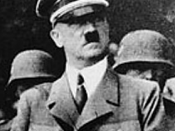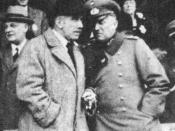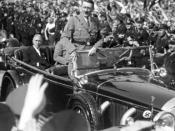The fact that Hitler became chancellor in 1933 was a big advantage for the Nazi Party because this helped them to gain back the votes they have lost since November 1932. If Hilter hadn't become chancellor at that particular point in time, then the support for the Nazi Party will continue to fall to a point where the loss is hard to recover. Hitler became chancellor was because of both subjective and objective factors. Subjective factor meaning Hitler demanded for the position by causing chaos in the Reichstag and using the SA as a threat. Objective factor meaning von Papen and some industrialists have persuaded Hindenburg.
After Hindenburg refused Hitler's demand for chancellor, Hitler used Reichstag chaos and the SA to pressure Hindenburg. The Nazis began to constantly cause chaos in the Reichstag. For example, on one occasion 167 Nazis beat up 57 members of the German Communist Party in the Reichstag.
They were then physically thrown out of the building. The Reichstag couldn't bear the violence because it was a serious place for political discussions and decision makings. Another example, all the Nazi members in the Reichstag would walk out during a meeting to show protest. This was a huge problem for the Reichstag because they weren't able to pass laws with one-third of the members missing. They needed all the members in order to run elections or pass laws, so without one-third of the members these events had to be delayed or called off. Being not able to do anything, the Reichstag clearly had lost its significance, and it seemed like that the Reichstag will remain this way unless Hitler was made chancellor. Also, at that time, the official German Army, limited to 100,000 by the Treaty of Versailles, was very weak compared to the SA which contained...


